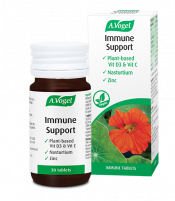Our customers love us!
We are proud of the products we offer and the high standard of customer service we deliver. Our customers love us so much they give us a customer rating of 4.8 out of 5!
The list of symptoms can seem endless, especially as they are so many that are unexpected or sometimes not directly associated with menopause. So, today I take a look at three more symptoms that you can experience, what causes them, how menopause can cause or contribute to them, and what can help ease them.
Today on A.Vogel Talks Menopause, I take a look at three more unexpected symptoms of menopause.
There are many well-known, as well as lesser-known menopause symptoms and so many women can experience quite a strange and unexpected combination of them. Falling hormones during menopause are often the root cause, but the stress that menopause puts the body under can also weaken your immune system and that can make you much more vulnerable to certain health issues.
So, I thought today that I would go through three issues that very often appear in menopause. They may not necessarily be directly associated with menopause, but a lot of women end up being much more prone to them when they go through menopause.
A lot of women can be more prone to cold sores during pregnancy and their menstrual cycle. So, there is definitely a link between your vulnerability to cold sores and to changes in your hormone levels, which is also experienced during menopause.
If you also add in other factors which can worsen during menopause, such as stress and fatigue, as well as poor diet and dry lips which can be a symptom during menopause, all of these can compound the situation, causing you to get more cold sores regularly.
What can help?
One of the best ways to treat cold sores is to use propolis ointment and you can apply this directly to the cold sores. Just make sure that it's an ointment rather than a cream, just so that it will stay on the skin a little bit longer.
You can look at supplements too. Zinc can be really helpful for healing. And also, there's a supplement called lysine which can be very helpful for treating cold sores.
Avoid triggers such as stress and sun exposure too.
Middle-aged women, so that's 40 to 60-year olds, are much more likely to get shingles than men in the same age group. And, again, this can be due to hormonal changes and also a weakened immune system.
What can help?
So, it's important to strengthen and support your immune system. You could look at supplements such as our Immune Support which contain vitamins and minerals, such as vitamin D, vitamin C, and zinc.

"I am convinced they are supporting my immune system. Easy to take."

You could also apply St. John's wort oil to the shingles. This is known to help decrease pain and irritation.
You can try to support and strengthen your immune system, generally, by looking at diet, looking at lifestyle, and also, dealing with stress.
Our Nutritionist, Emma, has compiled a great guide, the 'A-Z guide for supporting your immune system' which gives you lots of great tips and guidance.
This can be a horrible one because it can affect the way that you look. And very often, it's difficult to disguise puffy eyes with makeup.
Lowering oestrogen can affect collagen production, so our skin, especially around the eyes, can get much thinner. It can get less supported and we can end up with little wrinkles underneath the eyes.
Puffy eyes can also be linked to dehydration, which is very common during menopause. If you are also getting dark circles under the eyes, that's usually your kidneys begging for water.
What can help?
So, in this situation, you can look at makeup and creams that have hyaluronic acid in them because that's known to help to strengthen and support the skin.
Also, make sure that you drink plenty of water. Very often, after upping your water intake, puffy eyes can disappear within a couple of days.
Watch your intake of caffeine and fizzy drinks. Also, if you've got quite a high salt diet, that can result in puffy eyes. And make sure that your lymph system is working well. That's the system that helps to promote and support fluid in the body. The best way to do that is regular exercise to keep everything moving.
So, I hope you found these interesting and the tips helpful. If any of you have experienced any of these and have great ways of dealing with them, then please share your tips in the comment section below.
Until next week, take care.
We are proud of the products we offer and the high standard of customer service we deliver. Our customers love us so much they give us a customer rating of 4.8 out of 5!
Our Herbamare combines herbs and vegetables with a little sea salt to create a delicious, healthy seasoning for any dish!
Join Hetty and Martin in the A.Vogel gardens to improve your flexibility.
Carbohydrates have a bad reputation, but eating the right kinds can actually be great for weight management!
Alfred Vogel's guide to leading a healthy and happy life
Get new recipes in your inbox every week. Sign up now